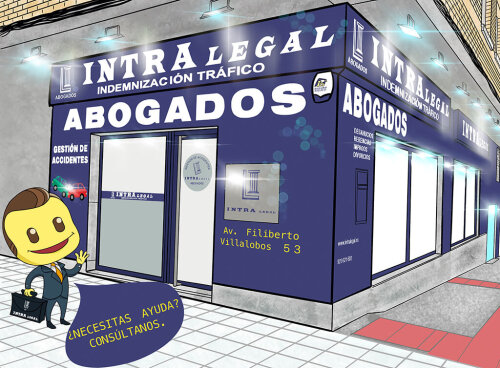Best Land Use & Zoning Lawyers in Salamanca
Share your needs with us, get contacted by law firms.
Free. Takes 2 min.
Free Guide to Hiring a Real Estate Lawyer
List of the best lawyers in Salamanca, Spain
About Land Use & Zoning Law in Salamanca, Spain
Land use and zoning laws in Salamanca, Spain, are a set of legal regulations that manage how land and property can be used, developed, or modified within the city and its surrounding areas. These laws are designed to ensure orderly development, protect the environment, preserve history and culture, and promote the welfare of the community. Land use and zoning regulations control the types of buildings allowed in various districts, how land can be divided, and how public and private spaces interact. Whether you own property, plan to build, or wish to start a business, understanding these rules is crucial for compliance and successful project approval.
Why You May Need a Lawyer
Legal issues related to land use and zoning can be complex and often require specialized advice. You may need a lawyer in situations such as:
- Applying for building permits or licenses
- Seeking a change in zoning classification or land use
- Facing legal disputes with neighbors, government authorities, or developers about property boundaries or permitted activities
- Dealing with fines, sanctions, or legal actions for zoning violations
- Navigating regulations related to historical property protection or environmental preservation
- Understanding the impact of local development plans on your property
- Purchasing or selling property with special zoning restrictions
A lawyer experienced in land use and zoning can guide you through Salamanca’s regulatory framework, help you prepare necessary documents, represent you in administrative hearings, and protect your interests.
Local Laws Overview
Salamanca’s land use and zoning laws are influenced by national, regional (Castile and León), and local legislation. The most important local legal instrument is the “Plan General de Ordenación Urbana” (PGOU), which is Salamanca’s general urban development plan. This plan divides the city into different zoning categories, such as residential, commercial, industrial, green spaces, and special protection areas. Each category has specific rules about what can be built, the allowable density, height limitations, required setbacks, and permitted land uses.
In addition to local plans, there are regulations for the protection of historical buildings due to Salamanca’s UNESCO World Heritage status. There are also environmental laws that restrict certain activities near protected areas like the Tormes River. Local authorities, mainly the Ayuntamiento de Salamanca (City Council), enforce these laws and handle permits, variances, and appeals.
It is important to understand that Spanish law requires compliance with all applicable local, regional, and national rules. Projects in protected or sensitive areas, or those affecting neighbors, are subject to extra scrutiny and public participation procedures.
Frequently Asked Questions
What is the PGOU and how does it affect me?
The PGOU, or General Urban Development Plan, is Salamanca’s main planning document. It determines permitted uses for each parcel of land, regulates building dimensions, and guides future city development. If you want to build, modify, or use land in a certain way, you must comply with PGOU requirements.
Do I need a permit to renovate my home?
Yes, most renovations require a building permit, even for interior work if structural elements, exterior appearance, or usage are changed. You must apply to the City Council before starting any renovation.
How can I change the assigned use of my property?
Changing land or building use, for example from residential to commercial, normally requires a formal request and approval from the local planning authorities. The change must be compatible with current zoning regulations.
Can I appeal a denied permit or zoning decision?
Yes, you can appeal administrative decisions through established procedures. Appeals are first made to the City Council, then possibly to higher authorities or in court if necessary.
Are there special rules for historic buildings in Salamanca?
Yes, historic or protected buildings, especially in the city center, are subject to strict rules regarding renovations, façade changes, and materials in order to preserve cultural heritage. Additional permits and reports may be required.
How can I find out the zoning classification of my property?
You can check the zoning classification at the planning office of the Ayuntamiento de Salamanca or online through municipal geographic information systems. The classification determines the uses and limitations of your property.
What are common zoning violations?
Common violations include unauthorized construction, exceeding height or density limits, operating a business in a restricted area, and making changes to protected buildings without approval. Violations can result in fines or demolition orders.
How do environmental regulations affect land use in Salamanca?
Environmental regulations may restrict development near natural areas, rivers, or protected wildlife habitats, and require specific measures for waste management and energy efficiency. Environmental impact assessments may be needed for significant projects.
Do I need neighbors’ approval for my building project?
Normally, you do not need direct approval from neighbors unless your project affects common areas or shared structures. However, neighboring property owners have a right to participate in certain administrative processes and can file objections.
What can I do if I am affected by my neighbor’s illegal construction?
You can file a complaint with the Ayuntamiento de Salamanca’s urban planning department. The authorities will investigate and may order corrective action if violations are confirmed.
Additional Resources
These organizations and resources can help you understand or resolve land use and zoning issues in Salamanca:
- Ayuntamiento de Salamanca - Urbanismo (Urban Planning Department): Handles permits, zoning information, licenses, and complaints.
- Consejería de Fomento y Medio Ambiente de Castile and León: Regional body overseeing urban development and environmental protection.
- Colegio Oficial de Arquitectos de Salamanca: Offers professional advice on building projects and zoning requirements.
- Official city website for access to PGOU documents, online zoning maps, and forms.
- Legal aid services and local lawyers specializing in property, urban planning, and administrative law.
Next Steps
If you require legal advice or assistance with a land use or zoning matter in Salamanca, follow these steps:
- Identify your specific issue or concern, such as a required permit, denied application, neighbor dispute, or planned development.
- Gather relevant documents, like property deeds, architectural plans, notices, or previous correspondence with authorities.
- Visit the Ayuntamiento de Salamanca’s urban planning office or website to access current regulations, zoning maps, and guidance documents.
- Consult with a lawyer who specializes in land use and zoning. They can review your situation, explain your rights and obligations, and help you navigate procedures.
- If facing a dispute, be prepared to participate in administrative appeals or mediation, with your lawyer representing your interests.
Timely legal advice can prevent costly mistakes and ensure your project or rights are protected according to Salamanca’s land use and zoning rules.
Lawzana helps you find the best lawyers and law firms in Salamanca through a curated and pre-screened list of qualified legal professionals. Our platform offers rankings and detailed profiles of attorneys and law firms, allowing you to compare based on practice areas, including Land Use & Zoning, experience, and client feedback.
Each profile includes a description of the firm's areas of practice, client reviews, team members and partners, year of establishment, spoken languages, office locations, contact information, social media presence, and any published articles or resources. Most firms on our platform speak English and are experienced in both local and international legal matters.
Get a quote from top-rated law firms in Salamanca, Spain — quickly, securely, and without unnecessary hassle.
Disclaimer:
The information provided on this page is for general informational purposes only and does not constitute legal advice. While we strive to ensure the accuracy and relevance of the content, legal information may change over time, and interpretations of the law can vary. You should always consult with a qualified legal professional for advice specific to your situation.
We disclaim all liability for actions taken or not taken based on the content of this page. If you believe any information is incorrect or outdated, please contact us, and we will review and update it where appropriate.










